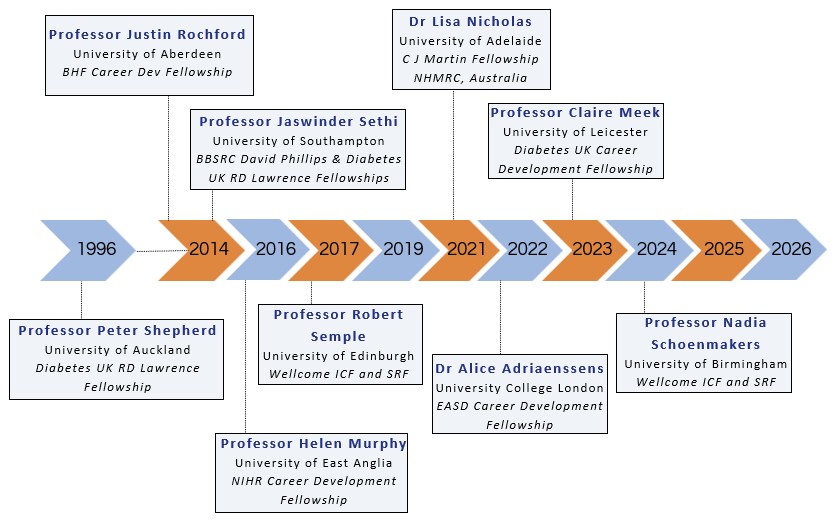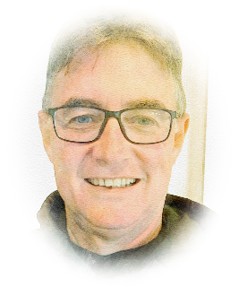Here we highlight researchers who have had a Career Development Fellowship whilst at the Institute of Metabolic Science over the years and who have gone on to successful careers in metabolic/endocrinology research in the UK and abroad.
The timeline above shows some of our past Fellows, the year they left Cambridge, the main Fellowship they held whilst here, and where they are now. You can find more details on some of them on the blue bars below (we are adding to this list as we gather information from them):
Of our current Professors and tenured PIs in the IMS-MRL, ten have previously held external career development and/or senior fellowships from external funding bodies in the IMS or one of its home departments:
Professor Stephen O’Rahilly (Wellcome Senior Clinical Fellowship)
Professor Krishna Chatterjee (Wellcome Senior Clinical Fellowship)
Dr Tony Coll (MRC Clinician Scientist Fellowship)
Professor Sadaf Farooqi (Wellcome Clinician Scientist and Wellcome Senior Clinical Fellowships)
Professor Paul Fletcher (Wellcome Advanced Training Fellowship and Wellcome Senior Clinical Research Fellowship)
Professor Fiona Gribble (Wellcome Clinician Scientist and Wellcome Senior Clinical Fellowships)
Professor Sue Ozanne (BHF Intermediate and Senior Research Fellowships)
Professor Frank Reimann (Wellcome Senior Fellowship)
Professor David Savage (Wellcome Clinical Scientist and Wellcome Senior Clinical Fellowships)
Professor Giles Yeo (Wellcome Intermediate Fellowship)
“Cambridge and the Department of Clinical Biochemistry (pre-IMS) set a high bar but provided a multi-disciplinary and highly collaborative environment to maximise the chance for great outcomes. It provided an ideal environment for a young researcher to not only learn from true global research leaders but to also develop one’s own research ideas”.
Current Position
Deputy Director, Maurice Wilkins Centre for Molecular Biodiscovery, and Professor of Cell Signalling, University of Auckland, New Zealand.
Biography
Peter Shepherd was educated in New Zealand and undertook post-doctoral studies at Harvard University before moving to a Diabetes UK R. D. Lawrence Research Fellowship at the University of Cambridge in 1993. He was appointed as a Lecturer at University College London in 1996 where his research focussed on understanding the signalling networks inside cells and how defects in these contribute to diseases like diabetes and cancer. While in London he became interested in commercialising research and was named London Young Biotechnology Entrepreneur of the Year in 2002. He was promoted to Professor in 2002 and moved back to a personal chair at Auckland University in 2004, keen to continue to work at the interface between research and commercialisation. He is also a principal investigator and deputy director at the Maurice Wilkins Centre, a Centre of Research Excellence that is dedicated to guiding basic research projects towards applied outcomes. He founded three other biotechnology companies in New Zealand, Symansis, Pathway Therapeutics and Amacas Animal Health. He was elected Fellow of the Royal Society of New Zealand in 2017.
X - @shepherdpeterr
“My 14yrs at Cambridge’s Dept of Clinical Biochemistry and subsequently at the IMS-MRL, was very influential in my journey to research independence.“
Current Position
Professor of Immunometabolism at the School of Human Development and Health, Faculty of Medicine, University of Southampton
Biography
Having received primary and secondary education in East London, Jaswinder graduated in 1993 with a First-Class Honours in Biological Sciences from Birkbeck College, University of London. During this time she also held a full-time technical research post at University College London with Prof. Andre McLean. She went on to obtain a DPhil in Physiological Sciences in 1997, from Oxford University, supervised by Antony Galione. Her postdoctoral training took place at Harvard University, Boston, focusing on the mechanisms of obesity-related insulin resistance with Gokhan Hotamisligil. Returning to the UK in 2000, Jaswinder joined Cambridge University, where she established and lead a research group investigating Immunometabolic Signalling in Adipose Tissue Remodelling and Metabolic Disease. After a break, she relocated her laboratory to the University of Southampton in 2017. She has been successively, a US-UK Fulbright Scholar, Wellcome Trust Prize Travelling Fellow, RD Lawrence Fellow, a David Phillips Fellow, a Cambridge Senior Scholar and more recently a Wellcome Trust Career Re-entry Fellow.
X - @SethiLab
“I’m hugely grateful for my seven stimulating years at the IMS. This precious protected time period quite literally transformed my career, supported the development of our multidisciplinary Diabetes Pregnancy research group and directly led to changes in healthcare policy, saving babies lives both nationally and internationally”.
Current Position
Professor of Medicine (Diabetes & Antenatal Care), University of East Anglia (UEA), Norwich, UK and Honorary Consultant Physician, Norfolk & Norwich University Hospitals NHS Foundation Trust, Norwich, UK
Biography
Helen Murphy is a Professor of Medicine (Diabetes and Antenatal Care) at the University of East Anglia, and a practicing clinician (Norfolk & Norwich University Hospital NHS Foundation Trust). She co-led the CONCEPTT Continuous Glucose Monitoring (CGM) trial, which led to changes in clinical practice. Her work in collaboration with Professor Roman Hovorka, demonstrates that hybrid closed-loop systems will transform the future clinical management of T1D before, during and after pregnancy. Based on pivotal studies, published in the New England Journal of Medicine, the CamAPS FX hybrid closed-loop system is licensed for use during T1D pregnancy, endorsed by the 2023 NICE technical appraisal, and is nationally funded for women who are pregnant or planning pregnancy. She is co-PI for PROTECT, a randomised controlled trial of CGM use in pregnant women with early-onset type 2 diabetes.
Helen also serves as clinical lead for the National Pregnancy in Diabetes (NPID) audit, which directly informs national healthcare policy, and contributed/contributes to the editorial boards of Diabetic Medicine, Diabetes Care and Diabetologia.
“My research interests, and my approach to understanding mechanisms of human disease through the prism of human genetics, bear the indelible stamp of the IMS-MRL, and particularly my years of mentorship from Steve O’Rahilly, and collaboration with fantastic collaborators such as David Savage and Ken Siddle. I will also be forever indebted to the wonderful groups of postdocs and PhD students who passed through my lab in my MRL years. It is a pleasure still to maintain collaborations with such MRL scientists as work begun in the MRL continues now further North!“
Current Position
Professor of Translational Molecular Medicine at the University of Edinburgh, and Dean of Postgraduate Research for the College of Medicine and Veterinary Medicine.
Biography
Robert Semple trained in Biochemistry and then Medicine in Cambridge, with clinical postgraduate training in London and Cambridge. He undertook a PhD in the laboratory of Professor Sir Stephen O’Rahilly before the existence of the IMS, which he moved into as a Wellcome Intermediate Clinical Fellow. He was also a fellow of Clare College from 2007-2017 and Director of the Cambridge MB PhD programme from 2013-2017.
Over the past 25 years his clinical and research interests have centred on acquired and monogenic disorders of insulin and PI 3-kinase signalling, growth and lipodystrophy. He aims to use rare human conditions to improve understanding of the cell and molecular basis of pandemic “insulin resistance”, and of the mechanisms linking it to major disease, and on translating research findings into clinical benefits for patients. A key focus is on using human genetics to gain insights into determinants of adipose resilience across the lifespan.
BlueSky - @semplelab.bsky.social
Current Position
Professor of Chemical Pathology and Diabetes in Pregnancy at Leicester Diabetes Centre. She is an Honorary Consultant at University Hospitals of Leicester NHS Trust and runs the diabetes in pregnancy service at University Hospitals Leicester, which includes a large, ethnically and socioeconomically diverse cohort of women with diabetes in pregnancy.
Biography
Claire started her research career at the University of Cambridge, studying nutritional interventions to improve glycaemia and weight loss in people with type 2 diabetes. Postdoctorally, she contributed to the CONCEPTT trial, assessing real time continuous glucose monitoring in type 1 diabetes in pregnancy, translated into clinical care internationally. In 2018, she received a Diabetes UK intermediate clinical fellowship to run a RCT of a dietary intervention in gestational diabetes (DiGest trial; recently finished). She also received a Future Leaders’ Award from the European Foundation for the Study of Diabetes (2019) in association with the Novo Nordisk Foundation, assessing progression to EoT2D after gestational diabetes. At the end of her fellowship, she moved to Leicester for a tenured professorial position. Claire has received several other national and international awards including from the American Diabetes Association, the European Diabetes in Pregnancy Study Group, the Association of Physicians (UK) and the British Medical Foundation.
X - @ClaireMeek5







